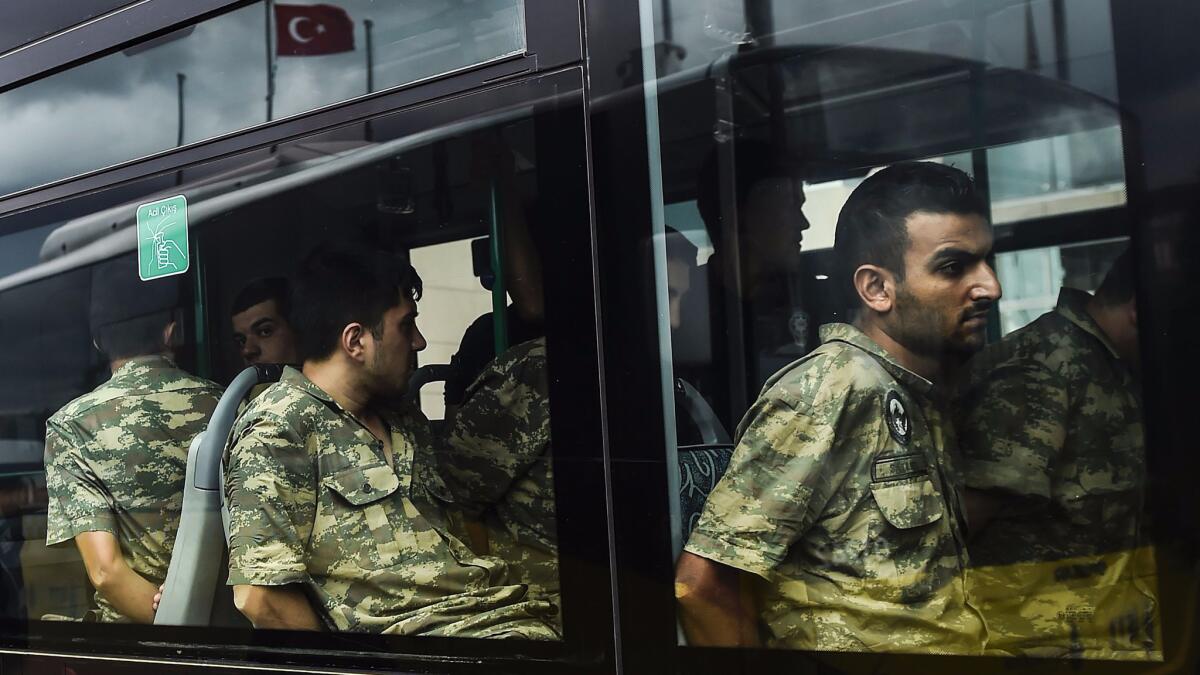Turkey declares three-month state of emergency days after attempted military coup

- Share via
Reporting from Istanbul, Turkey — Turkish President Recep Tayyip Erdogan on Wednesday declared a three-month state of emergency following a failed coup attempt last week by dissident military officers.
“The purpose of the state of emergency is to most effectively and swiftly take steps necessary to eliminate the threat to democracy in our country, the rule of law and the rights and freedom of our citizens,” he said.
At least 246 civilians and security forces members were killed in the coup attempt, which began Friday evening and was suppressed within 24 hours.
The government blamed the coup attempt on followers of Fethullah Gulen, a Muslim cleric who lives in self-exile in Pennsylvania and was once a close political ally of Erdogan’s. The Turkish government is seeking Gulen’s extradition from the United States.
In a statement after a full day of meetings with his national security advisors and then his full cabinet, Erdogan said he was acting under article 120 of the Turkish constitution, which allows for a state of emergency to be declared for up to six months in the event of widespread acts of violence aimed at destruction of the free democratic order.
“Never be worried. There is nothing to worry about,” Erdogan said in comments directed to the nation of nearly 80 million.
“The authority and will of the civilian leaders will grow more in this process,” he said.
Even before loyal forces arrested the last renegades, the government announced it was suspending thousands of military officers, judges and others from their posts as it investigates the coup attempt. The number of people suspended or detained has grown to about 60,000, including admirals and generals, clerics, finance ministry officials, teachers, university rectors and journalists — a purge that has prompted criticism and alarm from the U.S. and other countries.
The Turkish constitution requires a simple parliamentary majority to impose the state of emergency, but that is a foregone conclusion as Erdogan’s Justice and Development Party has an absolute majority, and leading opposition politicians have indicated they will support such a move.
“The state of emergency is intended to protect our democracy at this difficult time,” said a senior official who could not be identified because of official protocol. “It’s a temporary measure we were compelled to take.”
The official could not immediately say how the declaration would affect fundamental rights and freedoms of Turkish citizens. But he said the application of the state of emergency would be “strictly” in the area of national security and would not affect financial or commercial activities.
He said the decree would be submitted to the Turkish parliament Thursday and would not be subject to review by the constitutional court. The court itself is now being subjected to close government scrutiny, and two of its members have been detained and are being questioned for their possible role in the coup attempt.
A confession by a former top military aide appeared Wednesday in publications including the pro-government daily Sabah and the independent daily Hurriyet.
The former aide to the military’s chief of staff delivered a series of stunning revelations — among them that Gulen’s followers have dominated the Turkish military’s officer corps for the past quarter century.
Lt. Col Levent Turkkan, a Gulen supporter since he attended military academy, also said he had planted listening devices on behalf of the Gulen organization in the office of the former chief of staff, Gen. Necdet Ozel, who held his post from 2011 to 2015.
Turkkan said he would exchange the device daily and then handed it over to a Gulen backer working for the Turkish telecommunications authority.
“Yes, I am a member of the parallel establishment. I am from the Gulen community. After I was brought to the aide-de-camp position at the general staff, I started to execute the orders given on behalf of the community,” he said.
Turkkan said he was from a poor family and first encountered the Gulen movement, which ran after-school college preparatory courses around Turkey, when he was in middle school. They were eager to assist him when he told them he wanted a career in the military, and on the night before the exams for military high school in the city of Bursa in 1989, a “brother in the community” delivered the test questions to him, he said.
In the Gulen organization, “everyone had older guys responsible for them,” he said.
Gutman is a special correspondent.
ALSO
Turkish military staffers seek refuge in rival Greece
U.S. officials assure Turkey of America’s support for democratically elected governments
In Turkey, frightening moments of a coup attempt, with orders sent via a social media app
More to Read
Sign up for Essential California
The most important California stories and recommendations in your inbox every morning.
You may occasionally receive promotional content from the Los Angeles Times.










